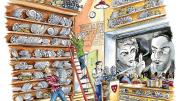1917
The editors advise Harvard men who want to serve their country in case of war to contact Professor R. M. Johnston, who is “acting in correspondence with the Intercollegiate Intelligence Bureau.” College-educated men are particularly sought after, because “Intelligent, unhysterical effort in the handling of American resources, human and physical, in the months to come, may effect far-reaching results.”
1927
The College Entrance Examination Board announces a new, standardized admissions exam called the Scholastic Aptitude Test.
The Department of Fine Arts, backed by the Fogg Museum and the University Library, announces plans to establish a library of those “motion picture films” voted worthy, by a faculty committee, of preservation as works of art.
1957
The “Harvard ‘Veritas’ Committee” circulates a letter urging fellow alumni to complain to the Board of Overseers about the appointment of J. Robert Oppenheimer ’26 as the biennial William James Lecturer.
1962
The Radcliffe Government Association’s rules committee recommends that any student past her freshman year be allowed to sign out of her dorm in the evening until any hour without advance permission. But, reports the Undergraduate columnist, a “determined number of ’Cliffies” insist that committee members mistakenly consider the average Radcliffe girl a stable and responsible adult capable of making reasoned decisions about “social problems.” Says one opponent, “People our age are notorious for being foolish.”
1972
The Committee on Housing and Undergraduate Life votes to condemn the term-paper industry after 40 to 60 student papers are stolen during intersession. Attorneys from Harvard and other Boston-area universities meet to consider possible court action to close the firms down.









